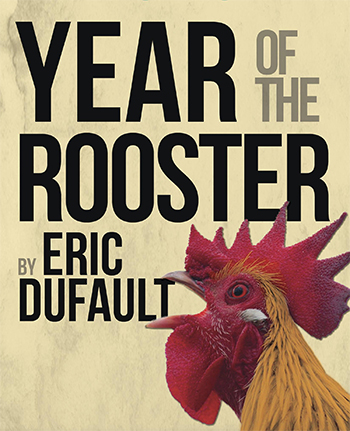
At the start of Act I, a rooster talks and acts like a man. At the end of Act II, a man talks and acts like a rooster. That in a nutshell is the story of Year of the Rooster, the current offering of the Fusion company at the Cell Theater in downtown Albuquerque.
How and why the rooster becomes humanoid and the human becomes beastly is the plot of this funny, violent, difficult and provoking story by the 20-something Eric Dufault that opened Off-Broadway in New York less than a year ago. The key to the success of the play is believable acting in unbelievable roles, and sharp direction with a keen eye for the idiosyncrasies of animal and human behavior. Fortunately the play is blessed on both levels.
We expect—no, demand—that our domesticated animals compensate for our own inadequacies and express our feelings for us. Thus in this play a dog, which belongs to a woman who sits passively in a chair all day, lies in her lap passively all day. Thus the pet fighting rooster of a man who secretly hates the world learns to make hatred into its own raison d’être.
“You make me to do what you haven’t the courage to do,” says the rooster to its owner. Earlier the rooster says, “I got an anger inside of me….I’m not scared of anything or anyone.” Later the rooster’s owner echoes his animal’s emotion: “I’m gonna make the whole damn world afraid.”
Rooster’s owner, however, is scared of just about everyone, including the 19-year-old girl who has just joined him as a waitperson at a McDonald’s Restaurant, the cocky promoter of cockfights and even his own nearly comatose mother. He is forced to rub his mother’s feet, show the waitress his destroyed eye beneath a patch and kiss the ring of the promoter.
In New Mexico, a state that until recently permitted legal dog and cockfights (it became the 49th state to ban cockfights in 2007), where both of these high stakes gambling exhibitions still widely exist illegally, and where thousands of dogs are trained to attack and sometimes kill people, this play is especially relevant. I wish everyone in New Mexico could see it. We have more than enough human dysfunction without remaking the animal kingdom in our own image.
The focal point of the play, as in many a story, is the moment when a character is transformed. Whether the transformation is due to the fates, as in Greek tragedy, or to personal flaws, as in Shakespearean tragedy, that moment of transformation is crucial.
On stage, this moment is the ultimate challenge for an actor who has spent the entire preceding play building a persona only to have to abruptly dismantle it, blow it up, decimate it. Each in their own way, the five characters in Rooster cross this threshold, and all five actors are able to reach into themselves to pass the test. They make the change believable, with the new persona emerging as credible as was the old one that was so carefully assembled and exposed to the audience.
There’s a lot of meat in this play as well as a lot of over-the-top humor, scenes of staged violence and an unceasing flow of rough language. It is a hard play to watch, and it must be an even harder play to perform. Director Aaron Worley, a Fusion veteran despite his comparative youth, has put together an unusually able cast, made the numerous scenes enclosed in a single simple set flow smoothly, and designed the acts of violence so that movement suggests far more than it shows. The greatest credit, however, belongs to the exceptional cast: Paul Blott as the promoter Dickie Thimble; Elizabeth Huffman as the mother Lou Pepper (a highly experienced actress and director from Portland, Ore.); Peter Diseth as the rooster’s humiliated owner Gil Pepper; Skye Watterberg (a senior at Albuquerque Academy) as the waitress Philipa; and especially Levi Shrader, who struts and crows and whimpers and brawls with poultry verisimilitude as the cock Odysseus Rex. With his red hair stiffened and teased into a comb, with claws on his hands and black combat boots on his feet, the strutting, lurching, violent and surly Odysseus Rex succeeds admirably in creating the aura of a cock.
Unlike its recent previous plays, Fusion will perform Year of the Rooster only at the tiny Cell Theater, 700 1st ST. NW. Performances will continue through Nov. 23, with Nov. 20-23 being pay what you will. For information and reservations go to Fusion Theatre’s website or call 505-766-9412.



Responses to “On Stage: A Thinking Animal, a Beastly Man”